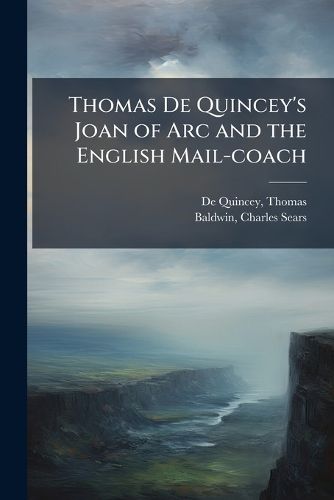Readings Newsletter
Become a Readings Member to make your shopping experience even easier.
Sign in or sign up for free!
You’re not far away from qualifying for FREE standard shipping within Australia
You’ve qualified for FREE standard shipping within Australia
The cart is loading…






This volume presents two significant works by Thomas De Quincey: "Joan of Arc" and "The English Mail-Coach." De Quincey, a celebrated 19th-century English essayist, is known for his eloquent prose and insightful observations on history, literature, and society. "Joan of Arc" offers a compelling and evocative portrait of the French heroine, exploring her courage and tragic fate. "The English Mail-Coach" is a more expansive and imaginative piece, blending personal reflections with vivid descriptions of the mail-coach system and its role in English life.
Edited by Charles Sears Baldwin, this edition provides readers with a valuable introduction to De Quincey's work, suitable for students and enthusiasts of English literature alike. Discover or rediscover these classic essays and appreciate De Quincey's unique literary voice.
This work has been selected by scholars as being culturally important, and is part of the knowledge base of civilization as we know it. This work was reproduced from the original artifact, and remains as true to the original work as possible. Therefore, you will see the original copyright references, library stamps (as most of these works have been housed in our most important libraries around the world), and other notations in the work.
This work is in the public domain in the United States of America, and possibly other nations. Within the United States, you may freely copy and distribute this work, as no entity (individual or corporate) has a copyright on the body of the work.
As a reproduction of a historical artifact, this work may contain missing or blurred pages, poor pictures, errant marks, etc. Scholars believe, and we concur, that this work is important enough to be preserved, reproduced, and made generally available to the public. We appreciate your support of the preservation process, and thank you for being an important part of keeping this knowledge alive and relevant.
$9.00 standard shipping within Australia
FREE standard shipping within Australia for orders over $100.00
Express & International shipping calculated at checkout
Stock availability can be subject to change without notice. We recommend calling the shop or contacting our online team to check availability of low stock items. Please see our Shopping Online page for more details.
This volume presents two significant works by Thomas De Quincey: "Joan of Arc" and "The English Mail-Coach." De Quincey, a celebrated 19th-century English essayist, is known for his eloquent prose and insightful observations on history, literature, and society. "Joan of Arc" offers a compelling and evocative portrait of the French heroine, exploring her courage and tragic fate. "The English Mail-Coach" is a more expansive and imaginative piece, blending personal reflections with vivid descriptions of the mail-coach system and its role in English life.
Edited by Charles Sears Baldwin, this edition provides readers with a valuable introduction to De Quincey's work, suitable for students and enthusiasts of English literature alike. Discover or rediscover these classic essays and appreciate De Quincey's unique literary voice.
This work has been selected by scholars as being culturally important, and is part of the knowledge base of civilization as we know it. This work was reproduced from the original artifact, and remains as true to the original work as possible. Therefore, you will see the original copyright references, library stamps (as most of these works have been housed in our most important libraries around the world), and other notations in the work.
This work is in the public domain in the United States of America, and possibly other nations. Within the United States, you may freely copy and distribute this work, as no entity (individual or corporate) has a copyright on the body of the work.
As a reproduction of a historical artifact, this work may contain missing or blurred pages, poor pictures, errant marks, etc. Scholars believe, and we concur, that this work is important enough to be preserved, reproduced, and made generally available to the public. We appreciate your support of the preservation process, and thank you for being an important part of keeping this knowledge alive and relevant.